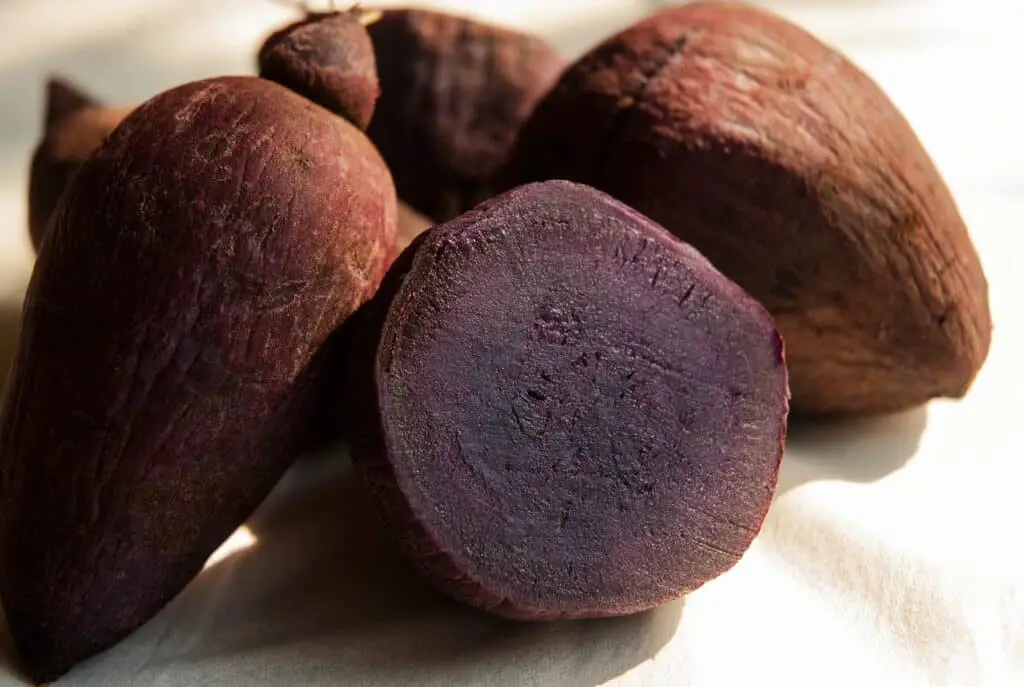Dog owners with picky eaters have it rough when feeding their four-legged companions.
This would mean lesser nutrient intake, and sometimes you may have to supplement beyond traditional dog food.
So, while looking for options, purple yams come to mind.
How about adding a sweet flavor to trick my dogs’ taste buds?
Hopefully, it’ll entice them; but then you wonder if it’s safe for dogs.
So, can dogs eat purple yams?
Yes, dogs can eat purple yams but sparingly.
Purple yams are nutrient-dense with minerals, fiber, vitamins, and antioxidants essential for your dog’s immune system.
However, only cooked yams are safe for canines.
Raw purple yams contain toxins like solanine that are lethal to dogs, even in small amounts.
The exact serving depends on your dogs’ size, so consult your vet before adding this nutritious delicacy to their diet.
It’s normal for dogs to eat everything accessible, but that doesn’t mean they should; however nutritious.
This article guides you on the benefits, the how and the best way to feed purple yams to your canines.

Why are purple yams good for dogs? Health benefits
Fiber-rich
Purple yams are fibrous, and fiber aids digestion when consumed in safe amounts.
Fiber also reduces carcinogen exposure minimizing risks of colon cancer.
Similarly, sufficient amounts of fiber help relieve symptoms of diarrhea and constipation in dogs.
Yams are low in calories, making them an ideal addition to your dogs’ diet without risking weight gain and other chronic diseases associated with fatty foods.
The fiber in purple yams creates a sense of fullness, making your canine friend feel full longer; thus, ingesting a few calories; helps in weight control.
Source of vitamins
Vitamin C boosts your dog’s immunity by curbing allergies, and fighting toxins, bacteria, and viruses.
It also stimulates collagen production, which helps in wound healing.
Purple yams also have traces of B vitamins (especially B-6) which aid in metabolisms and hormone regulation.
Loaded with antioxidants
Yams are rich with antioxidant properties beneficial for scavenging harmful free radicals in the body, minimizing inflammation in dogs.
This leads to a reduced prevalence of diabetes, cancer, and cardiovascular attacks.
Rich in minerals
Purple yams have calcium that aids in the building and maintaining healthy bones and muscles.
The presence of phosphorus improves your dog’s neural functioning.
Cooper in purple yams boosts brain function, while zinc boosts the overall immune system.

Can dogs eat cooked and raw purple yams?
Preferably, serve your dog-cooked purple yams.
Raw yams might be toxic and are challenging to chew.
Raw yams contain large amounts of toxins like solanine and oxalates lethal to canines.
Overeating raw purple yams may result in nausea, vomiting, diarrhea and stomach upsets in dogs.
It can also lead to choking and intestinal obstruction, causing severe digestive problems.
On the other hand, cooked yams baked, boiled or steamed are perfectly safe for dogs in moderate amounts.
Avoid seasonings and additives while preparing yams for your canine pals; else, you risk intoxication.
Boiled is better than fried or canned yams because the high fats and syrup content are not advisable for canines.
How to feed your dog purple yams
Prepare properly: Yams need proper preparation to make them safe for dog consumption. Clean well, peel the skin and cut it into bite-size pieces. Steam or boil without spices or seasonings and ensure it’s cooled before serving your canine.
Watch that portion: Although healthy, purple yams are highly fibrous, which can cause a laxative effect if consumed regularly. Therefore, avoid this by moderating the portions and frequency.
Frozen treat: Purple yams can sometimes be sold as frozen treats like ice cream. Limit the amount and frequency of feeding it to dogs since it can make them sick.
How much purple yams should you feed your dog?
The amount varies depending on the dog size and their underlying medical conditions.
When introducing new food to canines, start small and observe their response to the food—increase portions accordingly depending on their reaction.
Ideally, a teaspoon will suffice for small breeds, while two tablespoons are enough for larger dogs.
Observe and align the amounts with their daily calorie intake.
Although purple yams are nutritious for dogs, they could cause side effects in excess.
Consult your vet on the exact portion serving.
What’s the difference between yams and sweet potatoes?
Yams and sweet potatoes are tuber vegetables but vary in shape, texture, taste, color and nutritional benefits.
Yams are root vegetables cylindrical in shape and with a tougher woody texture.
They are starchy and drier than sweet potatoes.
Purple yams are cultivated in tropical areas in Africa, whereas sweet potatoes are grown in America—orange one being the most popular.
On the other hand, sweet potatoes are sugary and available in white and purple varieties.
Both share the same nutritional profile since they come from a tuberous root family.
Most canned yams are sweet potatoes; check the labels.
Can purple yam extract make a dog sick?
Yes, purple yam extract can make dogs sick.
It’s hard to come by purple yam since it’s imported from Africa; thus, the extract fills the market gap.
Unfortunately, most purple yam extracts contain toxins like Propylene and ethylene glycol, which are highly lethal to dogs, even in small amounts.
Symptoms of propylene poisoning are;
- Poor appetite
- Gastrointestinal upset (vomiting, diarrhea)
- Drowsiness
- Muscle weakness
- Behavioral change
- Lethargy
- Seizures
Can dogs be allergic to purple yams?
Dogs, just like humans, may develop allergic reactions when introduced to new foods.
If your dog eats purple yams and is allergic, this could manifest in symptoms like vomiting, excess itching, diarrhea, and eye buggers.
Generally, dogs allergic to purple yams will suffer from gastrointestinal issues like gassiness, abdominal pains, and bloating.
The bottom line
Purple yams are a healthy diet for fussy eaters but in rationed quantities—don’t be fooled by its low calories and dense nutrients.
Serve them clean, fresh and unseasoned, and watch how your furry pal will enjoy it.
Always consider your dogs’ health before adding new food to their diet; your vet will help you make the right decisions.
- What Dog Breeds Have Pink Skin? - March 24, 2023
- What Are the Most Inspiring Dog Breeding Quotes? - March 20, 2023
- Can Pheromone Spray Help Improve Dog Breeding Results? - March 19, 2023








